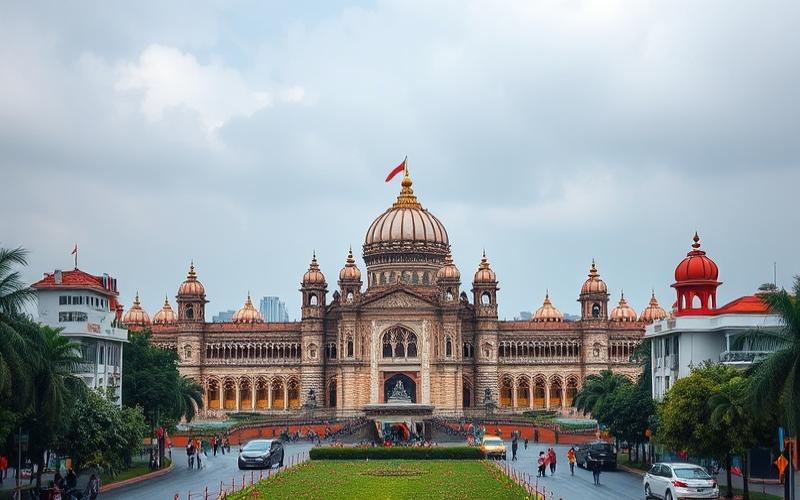
 Published on and written by Cyril Jarnias
Published on and written by Cyril Jarnias
Navigating the world of real estate investment abroad can be an exciting and lucrative adventure for expatriates, particularly in India, a country undergoing rapid economic transformation. With its fast-growing market, India offers numerous opportunities for savvy investors.
However, it’s essential to understand local nuances, specific regulations, and market trends to maximize your investment. This practical guide reveals the fundamental aspects to consider for a successful real estate project in India, from choosing strategic locations to understanding the necessary legal procedures.
Let’s dive together into this exploration where every decision can transform a simple purchase into a key step toward financial success.
Understanding the Indian Legal and Regulatory Framework for Real Estate Purchase by Expatriates
Main Laws and Regulations Governing Real Estate Acquisition in India by Expatriates
Real estate acquisition in India by foreigners is strictly governed by the Foreign Exchange Management Act (FEMA) and regulations from the Reserve Bank of India (RBI).
Non-resident foreigners (without Indian origin and without resident status as per FEMA) cannot directly purchase real estate in India, except in cases of inheritance or lease for a maximum period of five years.
Non-Resident Indians (NRI) and Persons of Indian Origin (PIO), as well as holders of OCI (Overseas Citizen of India) status, can acquire residential and commercial properties, but they are prohibited from purchasing agricultural land, plantations, or farms.
Summary of Acquisition Rights by Status
| Buyer Status | Purchase of Residential/Commercial Properties | Purchase of Agricultural Land/Plantations/Farms | Lease (max 5 years) |
|---|---|---|---|
| Non-resident foreigner | No (except inheritance) | No | Yes |
| NRI, PIO, OCI | Yes | No | Yes |
| Resident foreigner (under conditions) | Yes (with required approvals) | No | Yes |
Conditions to Reside in India During Property Purchase
A foreign national must prove their status as a “person residing in India” as per Section 2(v) of FEMA (presence >182 days/year), with specific approvals depending on the concerned state.
Citizens of certain countries (Pakistan, Bangladesh, Sri Lanka, Afghanistan, China, Iran, Nepal, Bhutan) face additional restrictions.
Real Estate Financing Regulations
Obtaining a mortgage loan: Indian banks primarily grant real estate loans to NRIs, PIOs, or OCIs. For resident foreigners, obtaining a loan is subject to RBI approval and presenting a strong application.
Funds used for purchase must generally come from abroad through banking channels authorized by RBI.
Indian financial institutions apply strict creditworthiness and regulatory compliance criteria.
Role of Institutions and Legal Framework
Reserve Bank of India (RBI): Central authority controlling currency flows and real estate transactions involving non-residents. It issues necessary approvals and establishes FEMA implementation guidelines.
Foreign Exchange Management Act (FEMA): Defines resident status and regulates foreign investment, including purchase, sale, and transfer of real estate in India by expatriates.
Tax Implications for Expatriates Owning Property in India
Tax status: Tax residence is established from 182 days spent in India per year.
Taxation:
- Indian tax resident: Taxed on worldwide income, including rental income and real estate capital gains.
- Non-resident: Taxed only on income generated in India (rents, capital gains from property sale).
Applicable taxes:
- Local property tax according to state and municipality.
- Tax on rental income.
- Tax on real estate capital gains upon resale.
International tax treaties: France and India have signed a treaty to avoid double taxation, allowing credit for tax paid in India against French tax due on the same income.
Key Takeaways
- Expatriates without NRI, PIO, or OCI status generally cannot acquire property in India, except in very limited exceptions.
- All operations must comply with FEMA and be subject to RBI approval.
- Local financing is strictly regulated, and tax implications require thorough analysis of the applicable bilateral tax treaty.
Good to Know:
The legal framework for real estate purchase by expatriates in India is primarily governed by the Foreign Exchange Management Act (FEMA) and supervised by the Reserve Bank of India (RBI). According to these regulations, expatriates can purchase apartments, but agricultural land and plantations are generally prohibited. Foreigners without resident status must obtain RBI approval to purchase properties, unless they reside in India for more than 182 days during the previous year. Regarding financing, non-residents can obtain a loan in India, but they must meet certain conditions, such as opening an Indian NRE or NRO bank account. Tax-wise, expatriates must pay property income tax and comply with existing tax treaties to avoid double taxation. The types of authorized properties vary, so thorough research on local laws and specific restrictions is essential to avoid any legal pitfalls during purchase.
Understanding Administrative Procedures and Obtaining Necessary Approvals
Real Estate Purchase in India for Expatriates: Administrative Procedures, Documents, Timelines, and Precautions
Specific Administrative Procedures
Required permits or status:
- Direct purchase by a non-resident foreigner is generally prohibited, unless the person holds OCI (Overseas Citizen of India) or NRI (Non-Resident Indian) status. Foreign nationals officially residing in India (“resident as per FEMA”) can purchase under conditions.
- A valid residence permit is essential for any real estate purchase. Without this document, real estate investment is not permitted.
Competent authorities:
- FRRO (Foreigners Regional Registration Office): Mandatory registration within 14 days of arrival for stays exceeding 180 days.
- RBI (Reserve Bank of India): Certain real estate transactions require declaration or approval from the Indian central bank depending on the buyer’s profile.
- Local land administration (State Land Revenue Department) for title transfer.
| Step | Authority/Service | Typical Timeline | Main Required Documents |
|---|---|---|---|
| Visa/residence permit application | Indian Embassy/Consulate | Variable (1 to 4 weeks) | Passport, supporting documents, forms |
| FRRO Registration | Local Office | Within 14 days (>180 days) | Passport, visa |
| Bank account opening | Bank | Few days | Visa, PAN Card, proof of address |
| Property transfer | Local Administration | Up to several months | Notarized sale agreement, KYC of seller & buyer |
Documents Required for Real Estate Purchase
- Valid passport at least six months after arrival
- Suitable visa or residence permit
- PAN Card (Permanent Account Number) – mandatory tax identification
- Proof of local address and proof of funds used
- Notarized sale agreement and complete KYC documents of seller and buyer
Precautions to Take
- Scrupulously verify property legality through a specialized local lawyer: clear land titles for at least the past twenty years
- Never make payment other than in Indian rupees from a personal local bank account; beware of restrictions on international transfers
- Exclude any agricultural/plantation purchase if you are a non-resident foreigner even with OCI/NRI status
Required Visa or Permit Types
List of statuses allowing investment:
| Status | Property Access |
|---|---|
| Tourist visa/traditional non-resident | Prohibited; only lease possible |
| Work/business visa + actual residence (>182 days/year) | Possible under strict conditions; FRRO & RBI involved |
| NRI / PIO / OCI Status | Authorized except agricultural land/rural property |
To obtain certain long-term visas (business/work/residence permit), provide complete application including financial justification and employer/sponsor institution letter. FRRO registration remains mandatory.
Specific Restrictions
- Direct purchase prohibited for foreign tourists without official recognized residence
- Cannot acquire agricultural/rural land except very particular cases recognized by RBI/central/local government – even with NRI/OCI status in some Indian federal states
- Absolute necessity of Indian tax number (PAN)
Concrete Examples from Recent Expatriates
A French expatriate holding a long-term work visa had to wait three months before her transfer was registered with local land authorities; she consulted a specialized lawyer who verified each step. Using a certified broker facilitated her access to mandatory banking procedures.
A British citizen holding OCI status could only purchase an urban apartment: he was explicitly denied any transaction involving agricultural land despite his reinforced request to local authorities. The overall process from agreement to key handover extended over five months due to mandatory anti-money laundering checks.
Essential Practical Tips
- Always use a certified legal firm knowledgeable about local land laws
- Require all official written cadastral histories before signing
- Allow significant margins in announced timelines; procedures sometimes lengthy depending on concerned federal state
- Systematically scan all transmitted documents; verify spelling consistency between passports/official documents
Useful Organizations:
- Foreign embassies often having a “consular affairs” unit
- French-Indian Chamber of Commerce & Industry: expatriation & investment assistance
- Government websites like Invest India or local portals state.gov.in depending on target region
Key Takeaway: Real estate purchase in India requires rigorous administrative anticipation, thorough understanding of local migration rules, and heightened vigilance during each legal/tax step.
Good to Know:
In India, purchasing real estate by expatriates requires deep understanding of administrative procedures, particularly the need to possess a valid visa or long-term residence permit like a business visa. It’s crucial to obtain prior approval from the Reserve Bank of India (RBI) to conduct real estate transactions, with procedures often taking several months. Foreigners must avoid agricultural or tribal areas, as these are generally prohibited for acquisition. Documents such as passport, residence permit, and proof of residence in India are required, and notary intervention may be necessary to authenticate documents. Local authorities, such as property registries, are essential to finalize the purchase, and they can be slow, making it useful to engage a local real estate attorney. Resources like the Indo-French Chamber of Commerce offer valuable assistance, ensuring expatriates meet all legal and cultural requirements, and recent cases of foreign investors highlight the importance of having legal counsel to avoid common pitfalls.
Exploring International Financing Options for Real Estate Purchase in India
Main international financing options for real estate purchase in India by expatriates:
| Financing Option | Main Advantages | Disadvantages / Restrictions | Typical Interest Rates | Common Documentation Requirements |
|---|---|---|---|---|
| Real estate loan from Indian bank | Direct access to local market, financing in rupees, process adapted to purchase in India | Restricted access depending on country of residence, strict borrower profile requirements, sometimes reserved for non-resident Indian nationals (NRI) | Often higher than in Europe or North America | ID, NRI/OCI status, income proof, bank statements, proof of address, employment contract |
| Real estate loan in buyer’s country of residence | Ease of management with usual bank, sometimes more attractive rates, documents in resident’s language | Often high personal contribution (20-40%), strict debt ratio, foreign exchange risk management | 3 to 3.5% for expatriates (Europe), generally higher than local resident | ID, stable employment contract (permanent or equivalent), tax notice, bank statements (3-6 months), proof of address, proof of personal contribution, bank account in bank’s country |
| Transferred personal funds (savings, cash) | Speed, no interest or debt, flexibility | Need to prove fund origin, tax and regulatory implications on international transfers | Not applicable | Fund source proof, banking documents, tax declarations |
Restrictions and Points of Attention for Real Estate Loans in India:
- Indian banks prefer non-resident Indian nationals (NRI) or OCI (Overseas Citizen of India) status holders for granting real estate loans.
- Foreigners not of Indian origin generally face severe restrictions to obtain local loans and acquire certain types of real estate.
- Personal contribution requirements are often higher for expatriates (20 to 40%), and banks require professional stability and tax transparency.
- Real estate loan interest rates for expatriates are generally higher than those for local residents.
Tax and Regulatory Implications Related to International Fund Transfers:
- Fund transfers to India must comply with local regulations (notably FEMA – Foreign Exchange Management Act).
- It’s essential to maintain fund traceability (transfer proofs, bank certificates) to avoid any blocking or money laundering suspicion.
- Depending on transferred amount, declarative obligations exist in country of origin and in India (double taxation risk, declaration obligation to tax administration).
- Transfer fees and exchange commissions may apply.
Practical Tips to Overcome Challenges Accessing Real Estate Financing in India for Expatriates:
- Compare offers from multiple banks in country of residence and in India, consulting if needed brokers specialized in international financing.
- Anticipate documentation requirements by preparing in advance all necessary proofs, including certified translation if needed.
- Verify applicable taxation and consult a tax expert to optimize transfers and avoid double taxation.
- Prioritize high personal contribution to facilitate loan approval and obtain more favorable conditions.
- Inquire about borrower insurance adapted to expatriate status, often required by banks.
- Consider exchange rate risk if loan is contracted in currency different from Indian rupee.
- Ensure real estate acquisition complies with Indian regulations for non-residents (property type, zoning, local restrictions).
Summary of Frequent Documentation Requirements:
- Valid ID
- Proof of NRI/OCI status or residence permit
- Stable employment contract and income proofs
- Tax notice in country of residence
- Recent bank statements
- Proof of current address
- Proof of personal contribution and fund origin
- Bank account in country where loan is contracted
Key Takeaway
Access to real estate financing in India for expatriates requires rigorous preparation of application, careful comparison of offers, and consideration of cross-border regulations on financial flows and taxation.
Good to Know:
For expatriates considering real estate purchase in India, Indian banks offer real estate loans to non-resident citizens (NRI), although often subject to strict conditions, such as the obligation to repay via an NRE (Non-Resident External) or NRO (Non-Resident Ordinary) account. Interest rates generally range between 7 and 10% and obtaining a loan requires complete documents, including proofs of income and residence abroad. In case of restrictions or complex processes in India, an alternative is to obtain a loan in the country of residence, although this may involve different rates. A more direct option is using transferred personal funds, but this requires rigorous tax planning to minimize international tax implications. To overcome challenges related to these financings, it’s often advised to consult international tax experts or specialized financial advisors, who can also help navigate local bureaucracy, thus facilitating access to financing adapted to your specific situation.
Optimizing International Taxation and Real Estate Investment Strategy as an Expatriate
International Tax Implications for Expatriates Investing in Indian Real Estate
Expatriates investing in Indian real estate are subject to complex taxation involving both Indian regulations and those of their country of tax residence. It’s crucial to analyze the situation from several angles: income and capital gains taxation, investment structuring, use of tax treaties, local incentives, estate planning, and regulatory compliance.
Main Tax Issues
- Expatriates are generally taxed in India on real estate income (rents, capital gains) generated locally. The rate depends on tax status in India: resident, non-permanent resident, or non-resident.
- India applies withholding tax on rents and capital gains received by non-residents.
- Double taxation avoidance treaties (DTA) signed by India with many countries allow avoiding double taxation on the same income. Tax credit or partial exemption is possible according to applicable treaty.
Investment Structuring to Optimize Taxation
- Use of offshore companies: Some expatriates structure their investment via a company registered in a tax-advantageous jurisdiction. This structure may limit taxation of income and capital gains in India, but India applies strict anti-abuse rules (GAAR) and increased transparency reduces effectiveness of these structures.
- Direct vs indirect holding: Direct holding by an individual exposes to local tax rates and declarative requirements. Holding via a local company (e.g., Indian Private Limited Company) may allow optimization, but entails taxation on dividends and management constraints.
- Use of tax treaties: Properly structure tax residence and ownership to best benefit from double taxation agreement advantages.
Tax Incentives and Their Use
India proposes certain tax deductions on real estate income:
- Deduction of loan interest for property acquisition or renovation.
- Property depreciation for companies.
- Partial or total capital gains exemption in case of reinvestment in another real estate property or certain specific securities.
For expatriates, it’s important to respect eligibility criteria for these incentives (holding period, investment nature, etc.).
Estate Planning and Asset Protection
Real estate held in India by a non-resident is subject to Indian inheritance law, which sometimes differs from the expatriate’s country of origin.
Planning advice:
- Draft a specific Indian will for properties located in India.
- Use trust structures for transmission planning and protecting assets against inheritance or tax disputes.
- Verify compatibility between Indian law and inheritance legislation of country of residence.
Donations are taxed differently according to family relationship and donation nature; anticipation is recommended.
Tax Compliance and Role of Experts
Respect declarative obligations in India (income declaration, tax payments, respect of fund repatriation limits).
Mandatory declaration in country of tax residence, with consideration of income and assets held abroad.
Assistance from local and international tax experts is indispensable for:
- Structuring investment in compliant and optimal way.
- Monitoring rapid evolution of Indian legislation (anti-abuse rules, cross-border flow control, etc.).
- Managing taxation in case of resale, inheritance, or capital repatriation.
Concrete Examples and Case Studies
| Situation | Recommended Structuring | Tax Result | Vigilance Points |
|---|---|---|---|
| French expatriate purchasing rental property in India | Direct holding, declaration in India and France, DTA use | Tax credit in France for tax paid in India | Obligation to declare property and income in both countries |
| Expatriate domiciled in Dubai purchasing via offshore company | Holding company in Dubai holding Indian company | Taxation on dividends and capital gains in India, exemption in Dubai | Risk of challenge by Indian administration, GAAR |
| Expatriate investing to transmit to children | Creation of Indian trust | Facilitated transmission, protection against fragmentation | Administrative complexity, trust creation and management cost |
Steps to Follow to Remain Compliant
- Verify tax status in India and country of residence.
- Study applicable double taxation avoidance agreement.
- Choose most suitable holding structure (direct, company, trust).
- Respect local and international declarative obligations.
- Regularly consult tax experts to anticipate regulatory developments.
Important Advice: Any expatriate investing in Indian real estate must anticipate local and international taxation, choose adapted structure, and consult experts to secure assets and optimize tax burden.
Good to Know:
Expatriates wishing to invest in Indian real estate must pay particular attention to international tax implications, especially regarding double taxation treaties to avoid double taxation on their income. Using offshore structures can offer tax optimization, however, this requires thorough understanding of Indian and international laws. Integrate local tax incentives, such as deductions for investments in infrastructure projects, to maximize net benefits. To protect real estate assets beyond borders, well-defined estate planning is essential, sometimes involving creation of trusts or international holding companies. It’s crucial to rigorously respect local and international tax regulations; seeking help from tax experts specialized in Indian tax law can greatly facilitate this process. For example, a recent case study showed that an expatriate using a double taxation treaty between France and India substantially reduced their tax charges.
Disclaimer: The information provided on this website is for informational purposes only and does not constitute financial, legal, or professional advice. We encourage you to consult qualified experts before making any investment, real estate, or expatriation decisions. Although we strive to maintain up-to-date and accurate information, we do not guarantee the completeness, accuracy, or timeliness of the proposed content. As investment and expatriation involve risks, we disclaim any liability for potential losses or damages arising from the use of this site. Your use of this site confirms your acceptance of these terms and your understanding of the associated risks.






















































